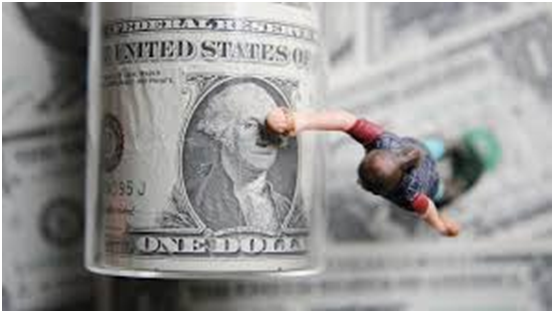
The US Federal Reserve, the central player in global financial markets, delivered a shock to investors around the world when it once again announced that it would keep interest rates unchanged. After refusing to cut interest rates six times in a row, the easing policy expected by the market failed again. So why has the Fed stuck to its guns and refused to cut rates? How does the underlying dollar hegemony affect the global economy?
First, let's look at the Fed's rationale. In its latest rate-setting statement, the Fed said that while inflation had slowed over the past year, it remained elevated. This means that while inflation has eased, it is not at the Fed's ideal level. At the same time, the Fed also pointed out that the US economic outlook remains uncertain, and inflation risks still need to be highly concerned.
But it's not that simple. Behind the Fed's refusal to cut interest rates is, in fact, the poor economic data in the United States. From much weaker than expected GDP growth to stubbornly high inflation indicators, the US economy appears to be Mired in a stagflation. Gao Ruidong, chief economist at Everbright Securities, put it bluntly: This dilemma puts the Fed in a quandary: cutting rates risks driving up inflation, or not cutting rates risks eroding the economy. Therefore, the Fed ultimately chose to control inflation as a priority, repeatedly delaying the rate cut.
Yet the implications for the global economy are profound. The high interest rate in the US dollar has led to the depreciation of many currencies and the rise of prices. Wang Qing, chief macro analyst at Orient Jincheng, said that the long-term high value of the US dollar has a very direct impact on the rest of the world. The test is particularly acute for countries with high external debt and a history of high inflation.
So how does dollar hegemony affect the global economy? As the main currency for global transactions and reserves, the dollar has the nature of a global public good. However, in practice, the United States often only considers its own interests and ignores the global public interest. This paradox has led to a number of major international economic and financial crises.
The United States has taken advantage of the strong position of the dollar to have a huge advantage in global trade. It can directly finance its huge trade deficit by exporting dollars, in effect imposing a seigniorage on the world. Simply put, the United States can buy global goods by printing more dollars. This privilege allows the US to easily pass on risks in times of economic crisis, while other countries have to bear the resulting losses.
This hegemony is not without costs, however. The blood-sucking effect of the dollar and its impact on global depreciation are gradually emerging. This is a blood draw for emerging markets. Emerging market currencies have depreciated against the dollar this year, with South Korea and Brazil losing about 6% of their value. This devaluation not only causes asset prices in these countries to fall, but also makes it harder for them to access capital, as the cost of capital increases.
Faced with the challenge of dollar hegemony, some countries have begun to seek ways to break the game. De-dollarization is feasible and necessary in the long term. Because too much reliance on the dollar can lead to too much spillover from the Fed's policies, and the Fed does not take into account other countries' economic conditions when making decisions. As a result, other countries need to find ways to settle bilaterally and reduce their reliance on the dollar. In the future, the dollar is likely to lose its role as an anchor in global commodity pricing. This means that other countries need to find new settlement and payment systems to avoid the risk of US abuse of dollar hegemony.
In short, behind the delay of the Federal Reserve rate cut is not optimistic about the US economic data and the challenge of the hegemony of the US dollar. As an important part of the global economy, the United States needs to recognize its responsibilities and obligations, and cannot only consider its own interests while ignoring the global public interest. At the same time, other countries also need to strengthen cooperation to gradually build an international settlement and payment system that can check the hegemony of the dollar. Only in this way can we promote more balanced and sustainable development of the global economy.

報告顯示,中國電力投資加速增長,預計2024年電網基建投資將超過5300億元。
近日,市場迎來了一則引人注目的消息:工業巨頭3M公司(MMM.N)在本周五公布了其季度業績報告,隨後股價飆升至近兩年來的
最近,外媒給OpenAI算了筆賬,今年可能要血虧50億美元。
近日,巴黎奧運會和世界鐵人三項協會聯合發布了一項重大決定,宣布因塞納河水質污染問題,原定於近期進行的奧運會鐵人三項首次下
當地時間7月18日,法國巴黎發生了一起令人震驚的持刀襲警事件。
近期,一則重大消息在國際舞臺上引起軒然大波,馬來西亞宣布加入金磚國家。
調查發現,互聯網和智能手機的使用幹擾了韓國近五分之一學生的生活。